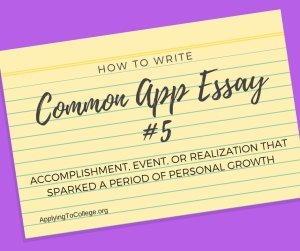 Writing a Common App essay? You may have heard there are some do’s and don’ts. You may feel ready to write, or a little bit panicky. Or you may just be looking for some extra help.
Writing a Common App essay? You may have heard there are some do’s and don’ts. You may feel ready to write, or a little bit panicky. Or you may just be looking for some extra help.
Welcome! This is your guide to the Common Application essay prompts. It’s the first of a seven-part series that will cover all the prompts. In it, you’ll discover advice and information to help you write your best Common Application essay.
You’ll learn what schools look for in a Common Application essay, how to choose an essay prompt, Common App do’s and don’ts, and how to avoid college essay pitfalls. I’ll give you essay examples, too.
Let’s Start with Common Application Essay Basics:
- The 2018 Common Application has seven prompts. You answer one of them.
- The Common App essay must be between 250-650 words.
- You can’t upload more than 650 words.
- Not every school accepts the Common Application, so check every college on your list for its essay requirements.
- Click here for the entire list of 2018 Common App essay prompts.
What Do Schools Look for in a Common Application Essay?
- Your writing skills.
- Your ability to communicate your ideas.
- Your personality on the page. (What do you care about? What makes you laugh, wonder, hope, dream, reflect, set goals, challenge yourself, want to change something? And why.)
- A learning or growth experience.
Now, for something very important: The Instructions.
The instructions are important not just to know what to do, but to understand why you’re doing this. What’s the purpose of this thing called The Common Application essay?
Common Application Essay Instructions
The essay demonstrates your ability to write clearly and concisely on a selected topic and helps you distinguish yourself in your own voice. What do you want the readers of your application to know about you apart from courses, grades, and test scores? Choose the option that best helps you answer that question and write an essay of no more than 650 words, using the prompt to inspire and structure your response.
 You’re essay’s got a purpose! Your essay tells the schools something positive you want them to know about you. It lets the schools get to know you in a way they can’t from the rest of your application. By making a personal connection, you help your application stand out. This is why you’re writing.
You’re essay’s got a purpose! Your essay tells the schools something positive you want them to know about you. It lets the schools get to know you in a way they can’t from the rest of your application. By making a personal connection, you help your application stand out. This is why you’re writing.
Okay, ready for the first prompt? Here we go…
Common Application Essay Prompt #1:
Some students have a background, identity, interest, or talent that is so meaningful they believe their application would be incomplete without it. If this sounds like you, then please share your story.
Is this Prompt for You? Look at the Keywords:
Background — Identity — Interest — Talent — Meaningful — Incomplete without it.
Do these Keywords Apply to You?
- “Background, identity, interest, talent.” These words are meant to spark your imagination. Take a minute and think about what’s shaped your life. Is it who you are…where you’re from…what you love…how you think…a cause you advocate…a hobby you just learned? You can write about almost anything as long as it’s important to the person you’ve grown to be.
- “Meaningful” means that this experience has shaped you in a fundamental way—it has influenced your choices, outlook, perspective and/or goals.
- Your application would be “incomplete without it.” You need to tell this story in order for people to fully understand you. You also haven’t told it anywhere else in your application.
Choose this Prompt IF:
1. This experience helped shape you in a positive way.
2. If you didn’t tell this story, the admissions committee wouldn’t fully understand you.

Pitfalls to Avoid:
- It has to mean something. Sure, you may like to swim or travel, but unless it’s a meaningful experience that helped define you in some way, it doesn’t qualify. You have to satisfy the keywords.
- Don’t omit what you learned. Even though the prompt doesn’t specify it, make sure the reader sees what you’ve learned or how you’ve grown from your experience. This is essential for a complete answer.
- Don’t sound like anyone else. Avoid writing about sports or mission trips—they’ve been written about so much most of them sound stale to admissions officers. It’s better to think about what else makes you stand out. If you’ve got the best recipe for chocolate cake or like to hunt for fossils, and you can link that to who you are, that’s going to be a more original topic.
Examples of Successful Essay Topics:
#1 – “Road Trip”
My student, Jeff, was the youngest of three brothers, both of whom were a lot older. (One was a teacher and one was in the Marine Corps.) Jeff was proud that the example his brothers set had helped him become responsible and mature, and he wanted to write about it. So he chose the summer they invited him on their cross-country trip, and the night they found themselves heading into a dangerous storm.
The two older brothers began arguing: One wanted to be safe and stop for the night and the other wanted to make it to their destination on time. Jeff recognized his brothers were at an impasse, so he checked the forecast and radar maps and figured out they could avoid the storm by taking a less direct route to their destination. When they stopped for gas, Jeff got out of the car and presented his solution. When they voiced their concerns, he calmly answered all of their questions. Eventually, his brothers agreed to continue using the longer route. When they got back in the car they asked Jeff to navigate.
By keeping a level head and finding the right way to communicate with his brothers, Jeff was able to facilitate a solution that satisfied everyone. He was proud that he helped lead them safely to their destination, and even prouder that he lived up to the examples of responsibility and maturity that his brothers had taught him.
Why Does this College Essay Topic Succeed?
- All the keywords are addressed. Jeff couldn’t talk about his identity without writing about his family. The example his brothers set for him made him expect a lot of himself and become a responsible leader in many of his daily activities. It was central to who he was.
- He learned from his experience. By being mature and thoughtful he found that he could make a positive difference in a difficult situation.
#2 – “Sharks”
Nina loved animals – the sweet, non-threatening kind. She volunteered with animals at the local zoo, but had always avoided the bigger, “dangerous” ones. But then she watched the movie “Jaws.” And, oddly, Nina fell in love with sharks. As an animal lover, she became interested in their preservation, and concerned about what she felt were inaccurate, overly negative portrayals.
Then Nina’s teacher assigned student presentations on a subject of their choice. Nina knew what she would do. Even though she was shy, she created a PowerPoint presentation designed to offer facts and to sway opinions. The class favorite was that humans have a greater chance of death by vending machines than by sharks.
Nina writes that while she might not have changed how all her friends think, the person who’s changed the most is Nina. Now when she volunteers with animals, Nina educates visitors about the more “dangerous” animals as well. And she will always argue for shark conservation.
Why Does this College Essay Topic Succeed?
- All the keywords are addressed. Nina couldn’t tell her story without writing about her love of animals. It was central to her identity and her application would be incomplete without it.
- She learned from her experience. As she acquired more information, her perspective about animals grew, as did her perspective on what she wanted her role to be. She learned to be an advocate and discovered a passion she didn’t know she had.
Example of a Poor Essay Topic:
“Friends”
David enjoyed hanging out with his friends. He was a good friend and liked to spend time talking with his friends while they all hung out together. David felt he was a loyal friend and that friends would always be important in his life.
Why Does this College Essay Topic Fail?
- The keywords are not addressed. It’s not clear why this topic is meaningful to David or why his application would be incomplete without it.
- There’s no learning or growth experience.
- Boring. Nothing about this idea stands out or feels original.
If David had thought more about this idea, then it might have become an interesting topic. Perhaps he had made a difficult decision regarding a friendship, or had a made a choice that failed and had to figure out how to make it right. Then this could very well have become a more successful essay.
How Do I Find Topic Ideas for My Common Application Essay?
1. Start by brainstorming. The trick is to make this fun! Scroll through your photos and take a look at your videos. Poll your parents and friends and ask them how they’d describe you. (But don’t let them make the decision for you — their memories and ideas aren’t necessarily yours.) Here’s a fun idea: listen to yourself think. It may sound silly, but how often do we think about something interesting, and then – poof – it’s forgotten. Pay attention to your thoughts. You may find you come up with an interesting insight or two.
2. Don’t stop at the obvious answers. After you think of an idea or two, think of one or two more. It gets harder, but it also forces you to really investigate what lies below the surface. Most important – don’t be afraid to be vulnerable. We all have fears and failures. None of us makes decisions that are right all the time. It’s how you deal with them that’s important. That’s what the colleges like to see.
Tip: For more help, read my post on how to start writing your college essay.
Next: How to Write Prompt #2: The Lessons We Take From Obstacles
If you enjoyed this post, I hope you’ll like my Facebook page
 Sharon Epstein is a Writers Guild Award-winner and two-time Emmy Award nominee, teaching students around the world how to master interview skills, write resumes, and transform their goals, dreams and experiences into memorable college application essays. She works with students everywhere: in-person, by phone, FaceTime, Skype and email. Visit my website for more info. Connect on Google+, Pinterest and Twitter.
Sharon Epstein is a Writers Guild Award-winner and two-time Emmy Award nominee, teaching students around the world how to master interview skills, write resumes, and transform their goals, dreams and experiences into memorable college application essays. She works with students everywhere: in-person, by phone, FaceTime, Skype and email. Visit my website for more info. Connect on Google+, Pinterest and Twitter.
Read the entire “How to Write” series:
How to Write Common App Prompt #1: Background, Talent, Identity, or Interest
How to Write Common App Prompt #2: The Lessons We Take From Obstacles
How to Write Common App Prompt #3: Challenged a Belief or Idea
How to Write Common App Prompt #4: A Problem You’ve Solved or Would Like to Solve
How to Write Common App Prompt #5: An Accomplishment, Event, or Realization
How to Write Common App Prompt #6: Topic, Idea or Concept that Makes You Lose Track of Time
How to Write Common App Prompt #7: Topic of Your Choice































